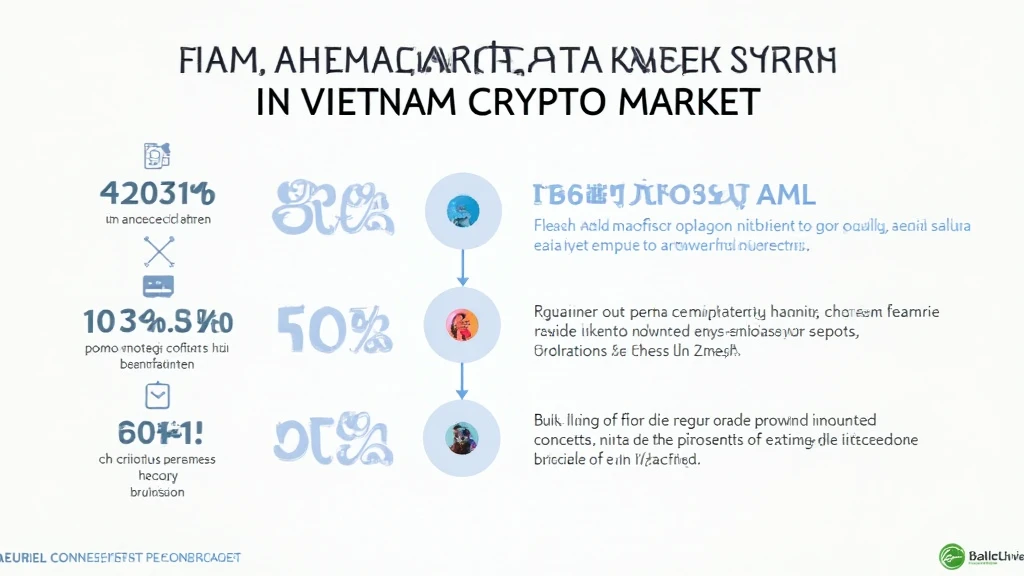Understanding Vietnam Crypto AML Compliance Frameworks
Understanding Vietnam Crypto AML Compliance Frameworks
As global interest in cryptocurrencies continues to surge, countries around the world are racing to establish frameworks that ensure the integrity and security of their financial systems. In Vietnam, the rise of crypto trading has propelled the need for effective anti-money laundering (AML) compliance measures. With reports indicating that over $4.1 billion was lost to DeFi hacks in 2024 alone, the emphasis on AML compliance has never been more pronounced. This article delves deep into the Vietnam crypto AML compliance frameworks, offering crucial insights for digital asset platforms.
1. The Importance of AML Compliance in Vietnam
Cryptocurrencies operate in a largely unregulated environment, making them enticing for illicit activities such as money laundering and fraud. In Vietnam, the Ministry of Finance is taking proactive measures to mitigate these risks, recognizing that robust tiêu chuẩn an ninh blockchain (blockchain security standards) are vital for protecting both the economy and consumers.
- In Vietnam, the Financial Intelligence Unit (FIU) has been pivotal in establishing and enforcing AML regulations.
- The growth rate of crypto adoption in Vietnam is among the highest in Southeast Asia, with a reported 7% annual increase in crypto users.
- Effective AML frameworks can enhance trust and credibility within the digital asset market.
2. Overview of Vietnam’s Regulatory Landscape
Vietnam’s approach to cryptocurrency regulation is evolving. The State Bank of Vietnam (SBV) has issued guidance on how cryptocurrencies should be treated, but the legal status remains a gray area. Compliance frameworks are heavily influenced by international standards. The FATF (Financial Action Task Force) recommendations play a critical role.

For instance, Vietnam is expected to align its legal framework with the FATF’s recommendations to ensure effective AML practices. This alignment is essential, as local entities must be equipped to detect and report suspicious transactions.
2.1 Current AML Regulations
Several key points highlight Vietnam’s AML regulations surrounding cryptocurrencies:
- Entities involved in crypto trading must register with the Ministry of Finance and undergo regular audits.
- Mandatory customer verification (KYC) processes must be implemented.
- Real-time monitoring and reporting of transactions over a certain threshold are required.
3. Implementing Effective AML Strategies
For organizations operating in the Vietnamese crypto market, implementing effective AML strategies is non-negotiable. These strategies should involve several essential components:
- Customer Due Diligence (CDD): Platforms must comprehensively understand their clients, verifying identities and assessing potential risks.
- Transaction Monitoring: Systems should be in place to detect unusual patterns of behavior and flag suspicious transactions.
- Training and Awareness: Staff should be trained on AML protocols and the importance of reporting suspicious activities.
3.1 Utilizing Technology for Compliance
Incorporating advanced technology, such as blockchain analytics tools, can streamline compliance efforts. For example, utilizing tools like Chainalysis can provide insights into potential risks associated with transactional data.
4. Challenges in AML Compliance
Despite these frameworks, Vietnam faces several challenges in enhancing its AML compliance measures:
- Lack of Awareness: Many users and even businesses remain uninformed about AML laws and the importance of compliance.
- Rapidly Evolving Technology: The fast pace of innovation in the crypto space makes it difficult for regulations to keep up.
- Cross-Border Transactions: The global nature of cryptocurrencies complicates the enforcement of local AML regulations.
4.1 Combatting Compliance Reluctance
Moving forward, it is critical for the government to engage in public outreach, educating stakeholders on compliance requirements and the importance of adhering to guidelines. Establishing partnerships with international bodies can also enhance local capacities for AML effects.
5. Future Directions for Vietnam’s Crypto AML Compliance Frameworks
Looking ahead to 2025 and beyond, Vietnam’s regulatory landscape is poised for significant developments:
- Institutional Partnerships: Collaborating with international regulators to adopt best practices.
- Continuous Adaptation: Evaluating and revising current laws to better fit the evolving crypto landscape.
- Integrating Smart Contracts: Developing compliance solutions within smart contract frameworks could enhance efficiency.
In conclusion, understanding and adhering to the Vietnam crypto AML compliance frameworks is essential for any platform wishing to operate successfully in this dynamic market. Ensuring compliance not only mitigates risks associated with money laundering and fraud but also promotes the legitimacy of the crypto industry in Vietnam.
For those looking to enhance their operational compliance, consulting with regulatory experts and investing in technology can be game-changers. As the landscape continues to evolve, staying ahead of compliance requirements is non-negotiable.
As a final note, always ensure that your platform’s operations align with local regulations and global best practices. Not only does this safeguard your business, but it also enhances the overall credibility of the cryptocurrency ecosystem.
Written by Dr. Nguyen Minh, a blockchain expert with over 15 published papers in financial compliance and a lead auditor for several high-profile crypto projects.





